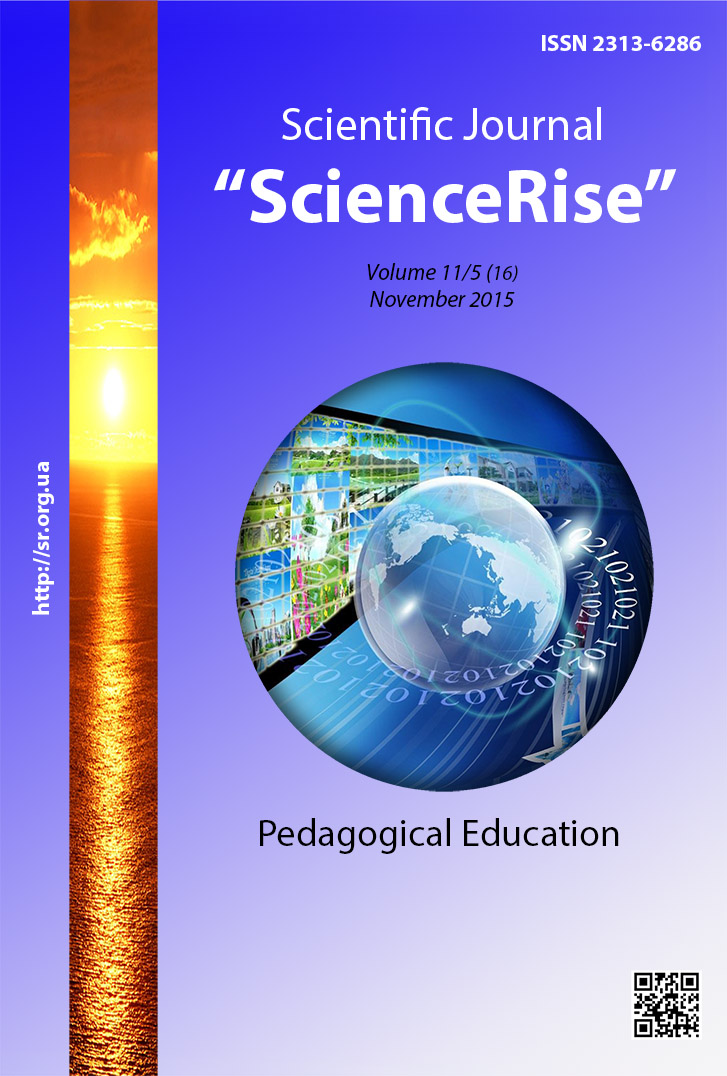Teacher self-education: formation of IC competence
DOI:
https://doi.org/10.15587/2313-8416.2015.54280Keywords:
self-education, informatively-communication competence, informatively-communication technology, informatively-pedagogical spaceAbstract
The article discusses the features of the formation of the main components of the IС competence of the teacher. It is analyzed the realization of motivational, cognitional, subject-activity and reflective parts depending on the level of informatively communication competence and taking into account the specific of self-education activity. The features of objective and subjective factors influence on motivation of increasing the level of IC-competence are investigated, importance of developing communicative skills is reflected as a factor of information integration into the pedagogicalassociationReferences
Natsionalna doktryna rozvytku osvity (2002). Osvita Ukrainy, 33.
Bashkirov, M. S. (1997). Samoobrazovanie i ego rol v formirovanii lichnosti uchitelya v usloviyah vuza. Saratov, 182.
Markova, A. K. (1980). Samoobrazovanie shkolnikov. Voprosyi psihologii, 3, 149–154.
Kochetov, A. I., Kolominskij, Ja. L., Prokop'ev, I. I.; Kochetova, A. I. (Ed.) (1987). Pedagogicheskaya diagnostika v shkole. Minsk: Narodnaya asveta, 223.
Soldatenko, M. M. (2006). Teoriia i praktyka samoosvitnoi piznavalnoi diialnosti. Kyiv: Vydavnytstvo NPU imeni M. P. Drahomanova, 198.
Turbovskiy, Ya. S., Provotorov, V. P. (1995). Diagnosticheskie osnovyi tselepolaganiya v obrazovanii. Russian Academy of Education. Moscow: ITOiP RAO, 116.
Hromtseva, A. K. (1983). Formirovanie u shkolnikov gotovnosti k samoobrazovaniyu. Moscow: Pedagogika, 145.
Kulyutkin, Yu. N. (1985). Psihologiya obucheniya vzroslyih. Moscow: Prosveschenie, 128.
Ruvinskiy, L. I., Sokolov, A. E. (1982). Psihologiya samovospitaniya Moscow: Prosveschenie, 143.
Zaborshchykova, M. M. (1988). Samoobrazovanie molodogo uchitelya kak uslovie sovershenstvovaniya ego professionalnoy deyatelnosti. Leningrad, 21.
Naumchenko, I. A. (1974). Samoobrazovaniya buduschego uchitelya. Saransk: Mordgiz, 252.
Zyazyun, I. A. (2004). Pedahohichna maysternist'. Pidruchnyk. Kyiv: Vyshcha shkola, 422.
Hershunskyy, B. S. (1987). Kompyuterizatsiya v sfere obrazovaniya: problemyi i perspektivyi. Moscow: Pedagogika, 264.
Lapins'kyy, V. V., Reheylo, I. Yu. (2013). Motyvatsiya navchal'noyi diyal'nosti shlyakhom zastosuvannya elektronnykh zasobiv navchal'noho pryznachennya. Visnyk Luhans'koho natsional'noho universytetu imeni Tarasa Shevchenka. Pedahohichni nauky, 15 (274), 174–183. Available at: http://nbuv.gov.ua/j-pdf/vlup_2013_15_24.pdf
Malanyuk, P. M. (1990). Povyishenie effektivnosti samostoyatelnoy rabotyi uchaschihsya pri izuchenii fiziki na osnovanii ispolzovaniya kompyuternoy tehniki. Kyiv, 164.
Samoylenko, O. M. (2007). Orhanizatsiyno-metodychni zasady rozvytku fakhovoyi kompetentnosti vykladachiv informatyky vyshchykh navchal'nykh zakladiv za dystantsiynoyu formoyu pidvyshchennya kvalifikatsiyi. Mykolayiv, 236.
Vorotnykova, I. P. (2011). Andrahohichni zasady profesiinoho rozvytku vchyteliv pryrodnycho-naukovykh dystsyplin zasobamy informatsiino-komunikatsiinykh tekhnolohii. Informatsiini tekhnolohii i zasoby navchannia, 2 (22). Available at: http://elibrary.kubg.edu.ua/3970/2/434-1443-1-PB.pdf
Papernova, T. V. (2011). Formuvannia IKT-kompetentnosti pedahoha v systemi neperervnoi osvity. Scientific World. Available at: http://www.sworld.com.ua/index.php/ru/pedagogy-psychology-and-sociology-311/interactive-learning-tech-nologies-and-innovations-in-education-311/7417-formuvannya-ktkompetentnost-teacher
Pokroieva, L. (2012). Formuvannia informatyvnoi kompetentnosti yak faktor osobystisno-profesiinoho zrostannia pedahohiv. StattiOnline. Available at: http://www.stattionline.org.ua/pedagog/106/18989-formu-vannya-informativno%D1%97-kompetentnosti-yak-faktor-osobistisno-profe-sijnogo-zrostannya-pedagogiv.html
Honcharenko, S. (1997). Ukrainskyi pedahohichnyi slovnyk. Kiyv: Lybid, 376.
Dysterverh, A. (1956). Rukovodstvo k obrazovanyiu nemetskykh uchytelei Yzbrannуe pedahohycheskye sochynenyia. Moscow: Uchpedhyz, 374.
Downloads
Published
Issue
Section
License
Copyright (c) 2015 Віктор Михайлович Орос

This work is licensed under a Creative Commons Attribution 4.0 International License.
Our journal abides by the Creative Commons CC BY copyright rights and permissions for open access journals.
Authors, who are published in this journal, agree to the following conditions:
1. The authors reserve the right to authorship of the work and pass the first publication right of this work to the journal under the terms of a Creative Commons CC BY, which allows others to freely distribute the published research with the obligatory reference to the authors of the original work and the first publication of the work in this journal.
2. The authors have the right to conclude separate supplement agreements that relate to non-exclusive work distribution in the form in which it has been published by the journal (for example, to upload the work to the online storage of the journal or publish it as part of a monograph), provided that the reference to the first publication of the work in this journal is included.

